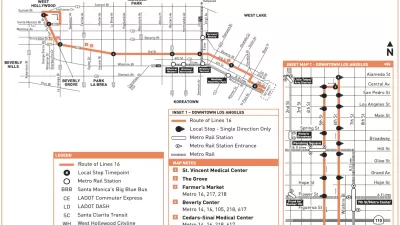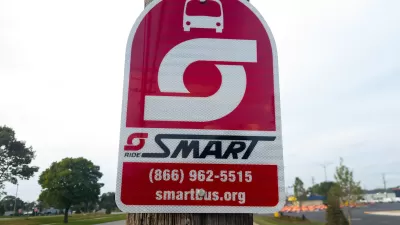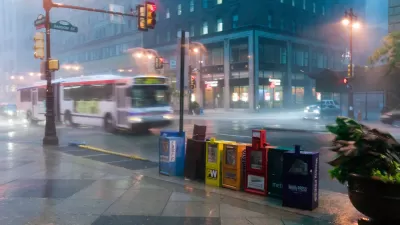Buses are often the best tool for making a dynamic, equitable city, but they're in a period of decline that shouldn't be allowed to become a death spiral.

Public transit in general is on the decline in the United States, and buses in particular have seen sharp drop-offs in travel speed, investment, and ridership. "Nearly 90 percent of commuters in this country drive private cars, and in many urban areas traffic congestion—i.e., wasted time, gas, and money—is getting worse," Laura Bliss writes for CityLab.
In most American cities, traffic congestion is slowing down buses as well, but there are good reasons to keep investing in buses. Not only are they cheaper and more versatile than rail and point-to-point transit, but also "buses can carry large numbers of people in a compact amount of road space. They don’t require special rights-of-way (though that’s sometimes ideal)," Bliss writes.
The recession saw cuts to bus funding that, in many cases, never got replaced during the recovery. And while some cities opted to invest in other forms of transit, the results have been mixed. "Even some cities on rail-building bonanzas, such as L.A. and Denver, are watching transit ridership decline across the board, in part because investment in buses has trailed so far behind the commitment to trains," Bliss argues. As people flee buses and services decline, their constituency gets smaller and less powerful. "They are disproportionately people of color, reinforcing the racial stigma associated with the bus in many cities," Bliss writes.
FULL STORY: Love the Bus, Save Your City

Alabama: Trump Terminates Settlements for Black Communities Harmed By Raw Sewage
Trump deemed the landmark civil rights agreement “illegal DEI and environmental justice policy.”

Planetizen Federal Action Tracker
A weekly monitor of how Trump’s orders and actions are impacting planners and planning in America.

The 120 Year Old Tiny Home Villages That Sheltered San Francisco’s Earthquake Refugees
More than a century ago, San Francisco mobilized to house thousands of residents displaced by the 1906 earthquake. Could their strategy offer a model for the present?

Ken Jennings Launches Transit Web Series
The Jeopardy champ wants you to ride public transit.

BLM To Rescind Public Lands Rule
The change will downgrade conservation, once again putting federal land at risk for mining and other extractive uses.

Indy Neighborhood Group Builds Temporary Multi-Use Path
Community members, aided in part by funding from the city, repurposed a vehicle lane to create a protected bike and pedestrian path for the summer season.
Urban Design for Planners 1: Software Tools
This six-course series explores essential urban design concepts using open source software and equips planners with the tools they need to participate fully in the urban design process.
Planning for Universal Design
Learn the tools for implementing Universal Design in planning regulations.
Clanton & Associates, Inc.
Jessamine County Fiscal Court
Institute for Housing and Urban Development Studies (IHS)
City of Grandview
Harvard GSD Executive Education
Toledo-Lucas County Plan Commissions
Salt Lake City
NYU Wagner Graduate School of Public Service





























